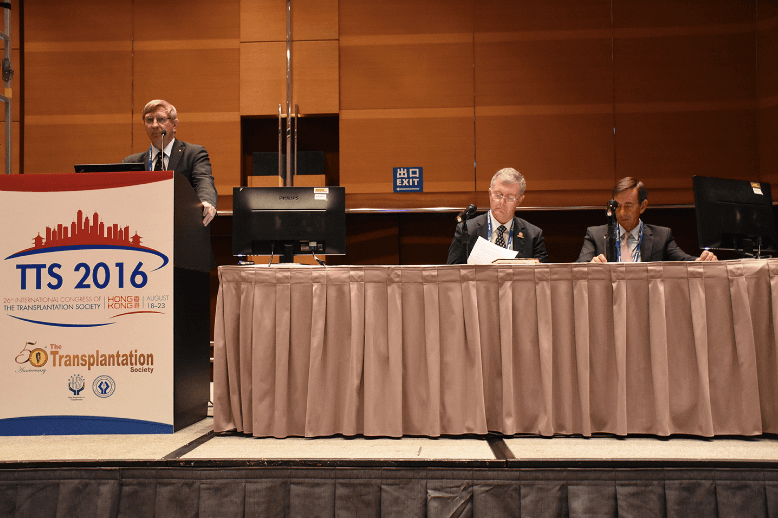HONG KONG—What was supposed to be a celebration of organ transplant reform in China has descended into contention and conflict. After Chinese authorities promised to overhaul their transplantation system beginning on Jan. 1, 2015—the date by which no more executed prisoners were supposed to be used for organs—global transplant officials arranged to hold their biennial industry conference in Hong Kong, as a way of affirming China’s commitment to ethics and transparency.
But as it became increasingly clear that no actual change in Chinese policy, law, or practice was in the offing, transplant leaders have begun to withdraw their support.
At a press conference on Aug. 19, Philip O'Connell, the president of The Transplantation Society, which is the global transplantation body hosting the conference here, and Jeremy Chapman, the chair of the program committee, rejected the idea that reform is happening in China.
“I have to tell you that there remains, in many sectors, a deep sense of mistrust of your transplant programs,” O'Connell said, reading comments that had already been presented to Chinese authorities. “It is important that you understand that the global community is appalled by the practices, which you have adhered to in the past.”
He added: “Many people in the global community are not persuaded that China has changed.”
Yet the day before, Chinese media enthusiastically reported that China’s vaunted reforms had in fact been welcomed. “Scholars believe that having a special session for organ transplantation in China demonstrates that the Chinese transplant world has truly been accepted by the international transplant society,” said Ta Kung Pao, a pro-communist newspaper in Hong Kong.
“They may say that, but that’s not what the truth is,” O'Connell retorted at the press conference, after a reporter read the quote out.
The first hint of the brewing controversy took place the day before, on Aug. 18, during a “graduate seminar” that was closed to the international press. Top Chinese transplant surgeons lined up to lecture on the alleged reforms that are supposed to be taking root in China, declaring that a “new era of transplantation” was afoot.
It was this seminar that was held up by Chinese media as proof that China’s system had been accepted.
What took place during the seminar differed markedly from those glowing accounts, however.
According to an attendee, the welcome mat had been removed for a particularly controversial liver surgeon, Zheng Shusen. Zheng was originally scheduled to speak about “a new era of liver transplantation” in China. But during the meeting another surgeon, Sun Shiyong, was instead called upon to speak on the topic.
Zheng, however, rose anyway and took the podium, according to an attendee. About five minutes after he sat back down, he quickly left the auditorium.
When the speeches were completed, Jeremy Chapman spoke in anger: “Someone who presented here today presented research that included data from executed prisoners. We will report him to the Chinese government; he will never present at a TTS conference again. The TTS is serious about this,” he said, according to a participant.
It remains unclear precisely why Zheng fell foul of TTS leaders. Chapman did not provide a direct answer when queried by a reporter at the press conference the following day.
It may, however, have had something to do with Zheng Shusen’s dual identity in China, brought to the attention of TTS executives by Epoch Times in the weeks leading up to the conference.
Zheng is the chair of the “China Anti-Cult Association” of Zhejiang Province, a Party-run organization tasked with vilifying Falun Gong, the Chinese spiritual discipline whose practitioners, researchers believe, have been killed in large numbers for their organs.
Zheng also penned a scientific paper documenting liver-matching within 24 hours, a key piece of evidence indicating that there is a pool of blood-typed donors, waiting to be harvested. This undermines the official explanation of organ sourcing by the Chinese authorities, which claims that transplants have traditionally come from death row prisoners.
Given the absence of a natural overlap between liver transplantation and anti-Falun Gong propaganda, researchers have pointed to Zheng Shusen’s connections as another sign of the links between the persecution of Falun Gong and the organ transplantation industry.
Also at the press conference, Chapman criticized as “scurrilous” a recent Epoch Times report that drew attention to previously undisclosed ties between his institution, Westmead Hospital in Sydney, and the Third Xiangya Hospital in the city of Changsha, China. Chapman said that the ties between the hospitals had indeed been properly declared.
A member of the Ethics Committee of TTS, and the president of the Transplantation Society of Israel, Dr. Jacob Lavee, wrote in response to Chapman’s self-defense:
“As a member of the TTS Ethics Committee I feel offended that neither he nor Dr. Philip O'Connell, TTS President, ever felt the basic ethical need to share that long-standing cooperation between their hospital and the Changsha Hospital, in which the use of organs of executed prisoners were known to have happened, with the members of TTS Ethics Committee.”
Chinese authorities adopted their own defensive posture the same day.
On the morning of Aug. 19, the leading newspaper connected with the Chinese Communist Party in Hong Kong, Ta Kung Pao, ran a full-page report declaring that the allegations of organ harvesting from Falun Gong, a persecuted spiritual group in China, were “ridiculous.”
Wen Wei Po, another pro-Party newspaper, ran a similar story, which in places used identical language. This copy of the newspaper was handed out for free at some Hong Kong subway stations—not a standard form of distribution for the newspaper.
The charge that organ harvesting from Falun Gong is a “ridiculous” claim was repeated not just in the press, but on numerous placards and banners that had been affixed to the metal barriers around the entrance of the Hong Kong Exhibition and Convention Center.
They had been placed by a front group with documented ties to mainland Chinese Communist Party organizations involved in the anti-Falun Gong campaign.





